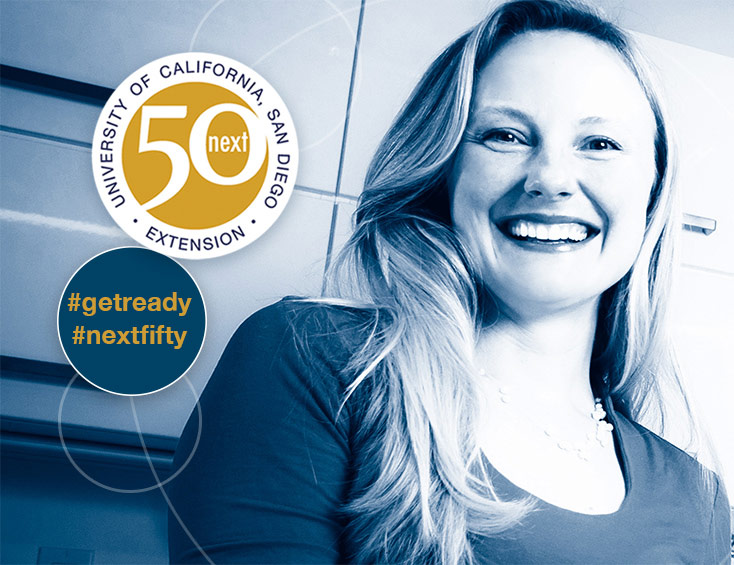
In honor of UC San Diego Extension's first 50 years, 50 Voices of the Future asks thought leaders about the trends, breakthroughs and social advances they foresee over the next 50 years.
Our health depends on a variety of things, from our genetic make-up to our lifestyles. But only recently have medical professionals begun to recognize the value of taking an “integrative” approach to health care – which means, as one writer recently phrased it, “exploring new ways to treat the mind, body and spirit at the same time.” Lauray MacElhern, managing director of UC San Diego’s Center of Integrative Medicine, believes that in the future, health care will rely more and more not just on what medicines we take but how we control our stress, how we prepare our food, even how we manage our thought processes. She predicts that a few decades from now, the best doctors will be experts in all these things – and we’ll all be much healthier as a result.
(1) Why is the work you do important?
Integrative medicine is all about empowering each individual with active participation in their own health care, not just passively receiving treatments and cares. It’s about bringing together both ancient wisdom and modern science into one place; that’s kind of the beauty of it. This approach helps people discover their own prescriptions for care – through diet, mindfulness-based stress reduction, yoga, other things – usually starting with the most natural, least invasive types of treatments. We’re also educating the next generation of health care professionals to have this new view of health care and how it should encompass all possible opportunities for healing, not just the ones that have been in their traditional training.
(2) What are the influential/exciting developments happening in your field now and why?
I’m very excited about the Academic Consortium for Integrative Medicine and Health – more than 60 other academic health centers and health systems around the country that have their own centers of integrative medicine. To me, it’s very telling about the direction health care is moving because it’s what patients are demanding, not to mention it’s also improving health outcomes and saving money for the health care system. I’m also really excited about the way we’re doing research now in integrative medicine. We’re taking more of a practice-based approach, which is really looking at uniformly collecting patient outcomes and health data and then using that data to analyze and look for all sorts of best practices. I think it’s a new gold standard for integrative medicine.
(3) What’s the next big thing?
I think there’s a really big gap between science and practice. I think this is where the opportunity really is. There’s this extraordinary lengthy of time between when solid research findings come out and then when those research findings become standard practice in the world of health care. It’s usually about 20 years. There’s a related gap in the world of nutrition. Dieticians and nutritionists are usually trained in terms of biochemistry and nutrition science, but they leave out the practical elements of shopping, cooking, preparation and meal planning. Chefs are taught these skills but chefs aren’t really taught these skills in the context of how to use food as medicine. So none of these fields really draws upon ancient wisdom, connecting other parts of integrative medicine such as chewing well, stress reduction, inner wisdom. So there’s this gap between nutrition education, the practice of healthy eating and integrative medicine that I think really represents the opportunity for the next big thing.
(4) How big an impact will your field play in shaping the future of the San Diego region and beyond?
At UC San Diego in particular, I think we’re uniquely poised to be a leader in integrative medicine, focused specifically on food as medicine. Southern California is hungry for this paradigm shift. Also, I think we draw upon a really unique position in San Diego. We’re right on the border with Mexico, we have this wonderful opportunity for cuisine and a rich cultural heritage to expand our thinking about food. We have extraordinary sea life; we talk a lot about the importance of sea weeds in our diet. Also, in California is such a rich agricultural hub. We’re surrounded by all these opportunities for learning and collaborative.
(5) Hop into your time machine…what does the future look like for this field in 50 years? How can individuals/companies get prepared for what’s next?
I think integrative medicine will just be good medicine. I don’t know that it will even be called anything. We’ll have a health care system that will put health care at the center and healthy habits will be supported by our society. Health and nutrition coaches are a fast-growing field and likely to play an important role in this transformation. Restaurants, hospitals, schools and any facility where food is part of the system will be providing healing-oriented foods and menu items, which will be the standards so that if someone wants to add unhealthy items, it will take a lot more effort. So the default will be the healthy items and if you want unhealthy items, that’s going to take a little extra effort. It will be so expensive and uncomfortable to live an unhealthy life that rarely will anyone choose this path. The first step is to envision it. Once we do that, we can take steps in the right direction.
Learn more about the ideas Lauray MacElhern discusses in this article in a range of Healthcare courses and programs offered by UC San Diego Extension, including the Fitness Instruction/Exercise Science certificate program, and courses such as Human Nutrition, Introduction to Nutrition Science, and Nutrition for Fitness and Sport.